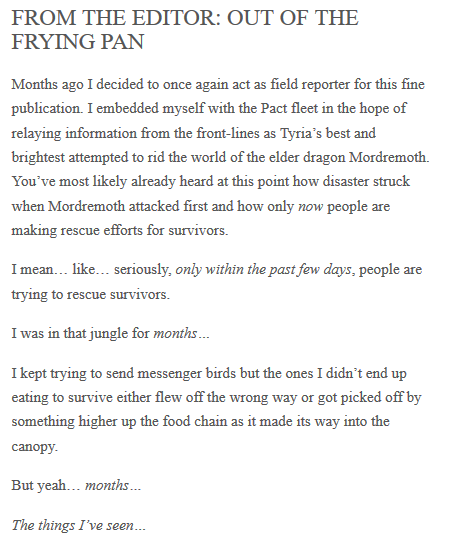Published on 19 Feb 2016
Thanks to over 5000 backers on Kickstarter, with mere hours to go, JourneyQuest has been renewed for a third season! Congratulations, thank you, and ONWAAAAAARD!
February 20, 2016
JOURNEYQUEST IS RENEWED!
January 23, 2016
World of Warships – How To Not Suck
Published on 20 Jun 2015
If I said to you “What’s Port?” and your answer is “A fortified wine from Portugal served by the Wardroom Steward at Mess Dinners” you’re either a Royal Naval Officer or someone who could probably benefit from watching this video. There’s no cure for being a Royal Naval Officer, but the cure for sucking at World of Warships is just one click away.
January 19, 2016
JourneyQuest Season 3 Kickstarter Begins
Published on 18 Jan 2016
JourneyQuest 3 is funding on Kickstarter now! Click here to renew the show for a third season: http://vid.io/xqEB
Now on Kickstarter! Renew JourneyQuest for an epic third season, featuring the ongoing adventures of Perf, a dyslexic wizard with a quest problem.Watch the first two seasons here: https://www.youtube.com/playlist?list…
December 5, 2015
The Terrible Mr. G
Uploaded on 26 Apr 2006
Guy playing CounterStrike gets recorded and remixed by someone at insoc.org.
Then I transcribed it, and a few years later, decided to make this subtitle video!
December 1, 2015
A Canadian “Swatter”
Cory Doctorow on the intersection of adolescent rage and police militarization, complicated by an international border:
“Obnoxious” is the online name of British Columbia teenager who spent years destroying the lives of women who had the audacity to create popular, lucrative channels on Twitch in which they streamed their amazing video-game play.
Obnoxious would get their IP addresses, dox them, DDoS them, try to blackmail them into befriending him and then to performing on-camera sex-acts for him, he would order pizzas and other crap to their homes, and then he would swat them.
“Swatting” is when you call someone’s local police force and pretend that you are a crazed gunman/bomber in their house, so that the cops show up locked and loaded, fingers on the trigger. At best, you terrorize your victim and her family; at worse, you get the police to murder one or more of them.
Jerks and people with emotional problems have used bomb threats and similar methods for decades. I went to a school where one kid — who was already in and out of residential psychiatric facilities — would routinely call in bomb threats. The precautionary principle applied — we’d go stand on the lawn and the cops would search the building — but there was none of today’s auto-immune disorder, no MRAPs parked on the lawn and cops in Afghanistan-surplus military gear hup-hupping through hallways with their fingers on the triggers.
Shutting down “Obnoxious” proved to be nearly impossible. The jurisdictional problems of getting Canadian cops to care about crimes in America, combined with American cops’ ignorance of “cyber” and tendency to blame the victims (a cop told one survivor of repeat swattings was told to stop playing games and “just pick up a book” to avoid more trouble), combined with the diffused nature of the crimes meant that Obnoxious operated with near-total impunity as he attacked more and more women.
October 27, 2015
A dispatch from the new (Guild Wars 2) front
![]() The Guild Wars 2: Heart of Thorns expansion was announced early in January 2015, but only released this month. The Orrator has a unique viewpoint of the new front opened up in the war against the dragons:
The Guild Wars 2: Heart of Thorns expansion was announced early in January 2015, but only released this month. The Orrator has a unique viewpoint of the new front opened up in the war against the dragons:
October 19, 2015
September 27, 2015
World of Warships – The Tirpitz!
Published on 27 Aug 2015
What’s the matter, Tommy… are ze Germans coming? Actually yes, they are and they’re in dirty great Battleships! I think we’re going to need bigger guns…
August 17, 2015
July 12, 2015
Gaming journalism
I really haven’t been following the uproar over the gaming journalism narrative … so this story may be completely off-base (but it does at least match some of what I’ve heard from folks who are invested in the argument):
Video game journalists: those guys who use phrases like “high octane,” “balls-to-the-wall” and “artistic integrity“; the sadomasochists who label factions of their own community xenophobes and fascists, for daring to express an ironic sense of humor; the enlightened few, who described fans as whiny and “entitled” for voicing their displeasure over the conclusion to a beloved franchise.
These past few years have not been kind to the gaming community. To put it mildly, of late, video game journalists have not been too generous to the gaming community.
“Give us your clicks, your Facebook shares, your unfaltering loyalty,” they say, all doe-eyed and loving. “Oh, and please don’t enable AdBlock!” Video game journalists excitedly invite their readership to view their news articles, reviews and opinion pieces, only to kick them to the curb when they’ve siphoned up the ad money. If that’s not how the state of play is, that’s certainly how it feels.
It’s like a depressing, unfulfilling booty call, where, ultimately, everyone comes out a little crustier and disease-ridden. The games journalists may earn some clicks for cash, but they lose little pieces of their souls, their innocence, their Bambi-like demeanor. Meanwhile, angry gamers hop about social networks, gnashing their teeth and venting their disdain for the press. The fans’ incredulity over the behavior of these journalists, in turn, makes the journalists just as incredulous. The fans feel downtrodden and used, the journalists feel violated and misunderstood, and a toxic cycle of hate ensues.
A number of culture critics and social crusaders have helped foster an atmosphere of tension and animosity, striking a war between gamers and members of the games press. However, while these individuals struck the match of the debate, the journalists hurriedly gathered the canisters of gasoline. In fact, little did the community realize, these self-interested people had not been on “their side” for quite some time.
H/T to Perry de Havilland for the link, and the rather eye-catching GIF:

July 7, 2015
World of Warships open beta
I’ve been keeping an eye on World of Warships, if only due to the renderings of the various ships (as a kid, I used to love the diagrams of ships in publications like Purnell’s History of the Second World War). I doubt I have the time to play the game very much, but I’ll probably sign up for the open beta which began last week.
At Massively Overpowered, MJ Guthrie talks to the developers:
Immersion. That’s not a word you often hear associated with lobby-based PvP games. But in the case of World of Warships, the third title in Wargaming’s WWII-era trilogy, it’s more than just fitting; it’s defining. Although not a battle simulation, WoWS offers a genuinely immersive experience thanks to the historical authenticity and the level of detail in both the audio and visual departments. You’ve heard the devil is in the details? Well that’s where the immersion is, too. And now that open beta has started, more players are finally able to dive in and experience this for themselves.
To learn more about how the development team achieved such a high level of immersion, I went to the source: I visited Wargaming’s headquarters in St. Petersburg and talked with the devs who create everything you see and hear in the game. And after watching the creation process in action, I appreciated the ambiance all the more when I jumped in for a hands-on in the closed beta.
Accuracy must take second place to what the players say they want, however:
Sounds really start to shine through once you turn the music down. Although the game’s smart music slider suppresses it when you fire, try clicking it off sometime to focus on the many ambient sounds. Tohtash said that the team has already added “about 3,000″ different sounds to the game. Players will actually hear different metallic sounds from the engines and hulls when the ships change speeds and from the guns when they fire. Engines have four different sound elements (engine, turbine, resonance, and post effects), and guns have three (attack, body, and echo or tail), which combine with recoil, load, and double echo. Using the various elements, the team took care to make different caliber of guns have different sounds. On top of all the types of sounds is the fact that they are positional, changing depending on what view players are in. If your camera is too close to the gun, you will get ringing in your ears after the shot!
Artillery sounds in World of Warships are something that diverges from historical accuracy. The team has access to reference videos, but focus groups have not wanted the more accurate gunfire sounds; they favor big booming ones. Tohtash admitted that actual sounds alone are a bit dry, but once effects such as implementing the bass and the full range of frequencies are added in, the sound is richer and fuller.
June 17, 2015
Guild Wars 2: Heart of Thorns pre-purchase now available
![]() Yesterday, Arenanet announced that the first Guild Wars 2 expansion, Heart of Thorns is now available for pre-purchase at http://buy.guildwars2.com. There is still no definite release date, but pre-purchasing will allow you to take part in the upcoming beta weekend events (just as they did for the original game).
Yesterday, Arenanet announced that the first Guild Wars 2 expansion, Heart of Thorns is now available for pre-purchase at http://buy.guildwars2.com. There is still no definite release date, but pre-purchasing will allow you to take part in the upcoming beta weekend events (just as they did for the original game).

May 20, 2015
Minecraft – the latest moral panic
At Techdirt, Karl Bode pours some scorn on a deserving demographic:
Like many people, video games have been an integral part of my life for about as long as I can remember. From my days visiting Wildcat! BBS systems where I’d play Trade Wars 2000 — to obsessing over the Apple IIe, IIc and IIgs — video games were not only an integral part of my childhood, they actually helped forge an adult career path. Swapping out graphics cards and building new PCs to play Quake 2 led to a job in Manhattan legal IT, which in turn resulted in a life focused on writing about technology. Aside from a few tics, I like to believe I wound up relatively normal, and video games have made my life immeasurably more rewarding.
That background usually forces me into the role of video game evangelist when surrounded by folks that, all too frequently, are engaged in hand wringing over the diabolical moral dangers games purportedly present. At a party recently, some friends expressed muted shock because a colleague’s kid was, instead of being social, playing a game in which he was “herding human beings and keeping them in a barn to eat.” I had to explain (skipping the part about how you’d need a mod to actually eat them) how this behavior wasn’t indicative of a Jeffrey Dahmer in training, he was simply engaged in normal problem solving behavior on the new frontier […]
Despite the fact that Minecraft is simply an amazing evolution of the Lego concept for the modern age, the moral panic surrounding the game never quite seems to abate. The latest case in point is over at the BBC, where the outlet implies it has heard all of the pro-Minecraft arguments before, it’s just choosing to ignore them in order to portray the game as an unpoliced virtual-reality hellscape that’s rotting the brains of children everywhere. While there are some good points embedded within, there are notably more bad ones, like the argument that kids should instead be reading, because reading engages imagination and builds character
May 9, 2015
A rather satisfying way to punish an in-game cheater
BBC News picked up the story of a Guild Wars 2 player who’d been cheating on a massive scale:
A character controlled by a hacker who used exploits to dominate online game Guild Wars 2 has been put to death in the virtual world.
The character, called DarkSide, was stripped then forced to leap to their death from a high bridge.
The death sentence was carried out after players gathered evidence about the trouble the hacker had caused.
This helped the game’s security staff find the player, take over their account and kill them off.
Over the past three weeks many players of the popular multi-player game Guild Wars 2 have been complaining about the activities of a character called DarkSide. About four million copies of the game have been sold.
Via a series of exploits the character was able to teleport, deal massive damage, survive co-ordinated attacks by other players and dominate player-versus-player combat.
To spur Guild Wars‘ creator ArenaNet to react, players gathered videos of DarkSide’s antics and posted them on YouTube.
The videos helped ArenaNet’s security head Chris Cleary identify the player behind DarkSide, he said in a forum post explaining what action it had taken. Mr Cleary took over the account to carry out the punishment.
H/T to MassivelyOP for both the original story and the BBC News link.
April 30, 2015
When Dungeons and Dragons met LEGO
A picture really can convey a thousand words:

I’ve often contend that three of the most significant influences on my adolescent years were: LEGO building, computer programming, and playing Dungeons & Dragons. With this latest mosaic project, I more or less bring all of those things together (the LEGO and D&D are obvious, while behind the scenes I have the software program I wrote to help me map out the whole mural).
For those not quite as nerdy as myself, here’s the background on this image. It is the cover to the boxed set of the 1977 version on the game Dungeons & Dragons. This was the first version of the game released as the “Basic” set. It was the first set that my brother and I owned and played with. Obviously, the countless hours I spent reading the rulebook and perusing the illustrations made a pretty big impression on me. In fact, I still run a Basic D&D campaign semi-regularly using this very set.




